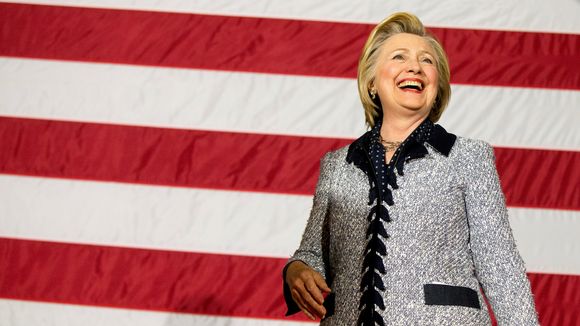Hillary Clinton Officially Becomes First Woman to Win Major Party Nomination

Hillary Clinton became the first female presidential nominee of any major party on Tuesday, a historic milestone that sets the stage for a battle to prove to voters that she is someone they can trust in the White House.
The second day of the Democratic National Convention was designed to offer reassurance to an electorate that has watched her on the national stage for more than two decades as first lady, then U.S. senator and secretary of state.
The validators tapped to send that message ranged from her vanquished primary challenger, Vermont Sen. Bernie Sanders, to her husband, former President Bill Clinton.
Late in the evening, Mrs. Clinton briefly addressed the convention via a video feed, appearing after an animated pane of glass shattered. “I can’t believe we just put the biggest crack in that glass ceiling yet,” she said to cheers.
Mrs. Clinton, who was defeated by Barack Obama for the 2008 Democratic nomination, proved to be a resilient campaigner in her second presidential bid, yet she also displayed campaign vulnerabilities that Republicans will look to exploit.
Chief among them are likability and trust. Wall Street Journal/NBC News polling has shown that both Mrs. Clinton and her Republican opponent, Donald Trump, are disliked by more voters than any nominee in the past quarter-century.
Asked why many voters distrust her, Mrs. Clinton has often said Republicans have sought to demonize her and subjected her to unfounded attacks. But she hasn’t always helped her own cause. For months, she defended her use of a private email account and server during her tenure at the State Department. FBI Director James Comey criticized her email arrangement as “extremely careless,” but said he wouldn’t recommend the Justice Department pursue criminal charges.
Polls showed voters haven’t bought her explanations, and Mrs. Clinton later said the move was a mistake and vowed not to repeat it.
Reversing voters’ negative sentiment fell to one of the party’s most persuasive speakers. Mr. Clinton highlighted Mrs. Clinton’s skill as an agent of change, recalling her work in Arkansas developing preschool programs and her efforts to overhaul the health-care system early in his presidency.
“She’s insatiably curious, she’s a natural leader, she’s a good organizer, and she’s the best darn change-maker I ever met in my entire life,” he said.
Mr. Clinton added: “Some people say, well, we need change, she’s been around a long time. She sure has, and she’s sure been worth every single year she’s put into making people’s lives better.”
And describing her activism as a young law student, he said: “Hillary opened my eyes to a whole new world of public service by a private citizen.”
He ran through a narrative of their lives together, from the multiple times she rejected his marriage proposals to dropping daughter Chelsea off at college, during which Mrs. Clinton obsessed about installing paper liners in her daughter’s dresser drawers.
Referring to last week’s Republican National Convention, in which most speakers attacked his wife and the delegates chanted “lock her up,” Mr. Clinton called their depictions a “cartoon” version of Mrs. Clinton that the Republicans made up because the “real” one is too tough to beat.
“Life in the real world is complicated, and change is hard,” he said.
Other speakers reinforced Mr. Clinton’s message, including former President Jimmy Carter, former Attorney General Eric Holderand former Secretary of State Madeleine Albright.
The evening also featured speakers who talked about her lower-profile efforts to help people coping with illness, loss and tragedy, and the mothers of seven black men killed in high-profile cases that sparked community outrage.
Mr. Sanders nominated Mrs. Clinton, sparking roars of approval from the crowd, a sign that the deep divisions that ran through the delegation just a day earlier were being smoothed over.
The Clinton campaign gave Mr. Sanders three nominating speeches for his candidacy, a roll call that counted his votes, and a moment that paid homage to his remarkable, insurgent candidacy. But a group of several dozen Sanders supporters left the convention floor after the roll call vote and conducted a sit-in in the media filing center.
Noman Khanani, a Sanders delegate from Massachusetts, said Mr. Clinton’s more personal portrait could help bring skeptics into the fold—but only within limits. “I’m still bitter but we’re supporting party unity,” he said. “Bill’s speech did a good job to humanize Hillary and win back that trust.”
A question facing the Clinton campaign is whether she can reshape public perceptions at a high-stakes moment late in her political career.
As far back as the early 1990s, when Mrs. Clinton first appeared on the national stage, her advisers worried that she was seen as a tough, partisan figure. Pollsters wrote a memo to Mr. Clinton’s first presidential campaign in 1992 laying out ways to “reduce voters’ discomfort with Hillary.”
“She knows she has work to do to earn people’s trust,” said Jennifer Palmieri, a senior Clinton adviser.
Wallstreetjournal